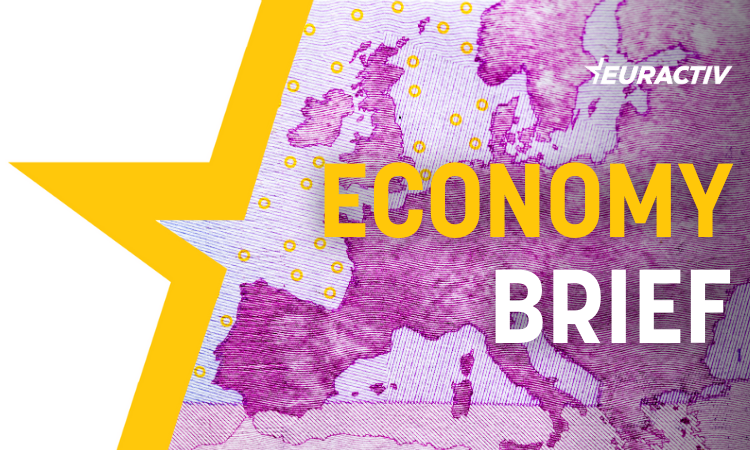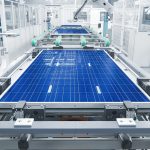
Europe’s industrial powerhouse is struggling.
Germany, the bloc’s largest economy, is in its second year of being close to a recession this year, with an economic growth of only 0.2% now expected by the government – severely revised downward last week, from previous 1.3% expectations.
Strikingly, however, the economic slump does not come with the mass unemployment the country has once seen, such as in the late 1990s and early 2000s, when it was last dubbed the “sick man of Europe”.
Quite the contrary: the country is plagued with severe labour shortages that will only get worse as ‘baby boomers’ retire and drag down its growth potential not only for this year, but also for the years to come. Still, politicians think they need to preserve jobs in industries where Germany is uncompetitive, such as green steel, whatever the costs.
Compared to the 90s, “now we have completely different problems that are slowing down growth, at the other end of the spectrum, if you like,” Stefan Kooths, Director of the Business Cycles and Growth Research Center at the Kiel Institute for the World Economy, told Euractiv.
“We are increasingly lacking the hands and brains with which we can be economically active here at all,” he added.
Brace for ageing society
Within Europe, Germany does not stand alone with that problem, because the whole continent is getting older. With more and more ‘baby boomers’ (those born in the late 1950s and 60s) retiring, job vacancies are piling up to replace senior employees leaving the workforce for good.
In an under-reported paper last year, the European Commission called upon all EU countries to adapt their policies to the ageing society, which creates a “huge gap in the labour market”, as Commission Vice President Dubravka Šuica put it.
Talking about what this would mean in practice entails touching upon more and less politicised topics that partly explain the conundrum economic policymakers find themselves in.
One obvious solution is legal migration, which Germany has been making efforts to step up, but the country’s labour needs are humongous.
According to Monika Schnitzer, head of the German Council of Economic Experts, Germany would need a net immigration of 400,000 people each year. Germany has in fact achieved this in most of the last few years, but only due to inflows from migrants fleeing wars and seeking asylum.
Now, politicians of all parties highlight they want to better select the migrants that are coming to the country – and recently adopted a bill to make it easier to deport migrants who do not have legal status, with Chancellor Scholz saying this was needed on a large scale (see our Chart of the Week below).
Another strategy is mobilising women for the labour market, especially by offering child and old-age care – although that in turn creates new job vacancies in the care sector, which is already set to increase given the rising number of seniors in need of care.
A less obvious solution can be found in the realm of industrial policy.
Because when you listen carefully to European – and particularly German – politicians, they still think they need to “create jobs”, no matter the costs.
Germany, for its part, is spending about €10 billion in subsidies to build up green production sites for energy-intensive industries, such as steel (which gets €6 billion alone), aluminium, glass and the likes – which comes on top of €15 billion for chipmakers such as Intel and TSMC.
That is despite the fact that Germany, compared to other European countries, will see worse conditions to produce these goods, given that renewable energy prices will be higher compared to countries with more intensive sun hours, or with more hydropower.
“Andalusia, for example, will simply be more attractive than Ludwigshafen in the future, at least for the energy-intensive industry,” Philipp Jäger, Policy Fellow at the Jacques Delors Centre Berlin, argued in an op-ed published this week, in reference to the hometown of Germany’s chemical giant BASF.
Asked this week why Germany should produce its own green steel instead of importing it from other European countries, German Economy Minister Robert Habeck (Greens) was quick to point out that “employment takes place there”.
Even more bluntly, at a car industry event on Wednesday Anke Rehlinger (SPD/S&D), prime minister of the small state of Saarland, called it a “horror scenario” to import basic materials such as chemicals or steel, instead of producing it domestically.
Time for more honesty
Calling for more honesty in the debate, Rehlinger said she “would rather spend billions to preserve jobs than [to] finance unemployment”.
Steel producers in Saarland are supported with €2.6 billion in subsidies, but only around €800 million (30%) come from the local state government.
Kooths, however, argued: “That’s the thinking of the 1990s against the backdrop of mass unemployment”.
Again, unemployment is not the problem today – and unlikely will be in the near future.
“There is a shortage [of workers] in every nook and cranny,” Habeck said.
Overall, it could be acknowledged that given its shrinking workforce, its increased labour needs in the care sector, and its comparably high energy prices, Germany will not be able to produce everything it needs by itself.
But that doesn’t all mean doom and gloom.
Most value-added in the German industry happens in the later stages of the value chain, such as the production of machinery and cars, while energy-intensive goods only account for 2.5% of German GDP.
If producers of higher value-added goods are to stand a chance of competing in global markets, they will need steel and other energy-intensive basic materials from where it can be most cheaply produced within Europe, Jäger argues.
A similar point was also made by Karl Haeusgen, president of Germany’s machinery maker association VDMA in a conversation with journalists last year.
“We buy a lot of steel as a company,” Haeusgen, who is also co-owner of HAWE Hydraulics SE, said. “Whether I buy this steel in Northern Europe, Central Europe or Southern Europe is completely irrelevant,” he added.
“Now that we are, demographically speaking, in the ‘comfortable’ situation that job cuts at individual locations no longer have the dramatic social consequences that we perhaps had in the 70s, 80s and 90s – because the labour market is absorbing a significant proportion of the workforce again – I think we should have a little more courage to embrace structural change,” he said.
It can be assumed that ECB president Christine Lagarde had something similar in mind when she called upon Germany to “revamp” its business model.
Habeck, however, said this week he doesn’t want to let go of any industry in Germany.
Maybe he needs to rethink: saying goodbye to some energy-intensive producers could help focus on those that really matter.
Chart of the Week
Germany is currently reaching its annual needs for net migration.
However, this is mostly due to refugees and informal migration, whereas politicians of all parties highlight that they want to get migration under control – and German chancellor Olaf Scholz announced to “finally deport on a large scale those who have no right to stay in Germany”.
At the same time, the government is trying to step up legal migration, particularly of high-skilled workers, which is currently way too low, and therefore the country’s biggest ‘growth obstacle’, according to Scholz.
Economic News Roundup
Pressure is mounting on EU finance ministers to open up new routes for the bloc to finance defence assets. A non-paper circulated by the Czech Republic ahead of this week’s Ecofin meeting revealed growing momentum for loosening EU investment rules and EIB lending criteria in order to channel more public and private-market funds into assets beyond the dual-use application – controversially calling for the expansion of ‘social sustainability’ definition within the EU Taxonomy. Read more.
Trade between the European Union and Russia kept sliding in the final quarter of 2023. A report posted by the EU’s official statistics office found that total EU-Russia trade fell to €6.69 billion in December last year, down from €6.87 billion in September and €28.80 billion in February 2022 — the month the Kremlin launched its full-scale invasion. “I think what we’re seeing is the gradual untangling, or the gradual decoupling, [of] the Russian and the EU economy,” said Janis Kluge, a senior associate at the German Institute for International and Security Affairs. European imports of Russian liquefied natural gas (LNG) and fertilisers remain substantial, however. Read more.
The EU’s cohesion policy must be urgently restructured to ensure the EU’s “survival”. According to a new report set up by the European Commission, 60 million European citizens currently live in regions where GDP per capita is lower than in 2000 while a further 75 million reside in places where annual GDP per capita growth has only been marginally above 0% since the turn of the century. Such “development traps” are predominantly located in rural or deindustrialised areas — the same places where anti-EU sentiment is particularly pronounced. “We need to act, and we need to act now,” said London School of Economics professor Andrés Rodríguez-Pose, who chaired the study. Read more.
Cross-party panellists at an EPP event urged the policymakers to address the EU’s housing shortage. Between 2010 and 2022, rents across Europe increased by 19% and house prices by 50%. The lack of affordable housing comes on top of a growing social crisis across Europe, with more than a third of EU citizens currently having trouble paying bills some or all of the time. “The existence of the housing [problem], combined with the cost of living crisis, [could] lead to paralysing economic activity [and] leave a negative imprint on the social economy,” said Marina Stefou, the secretary general for demography and housing at the Greek Ministry for Social Cohesion and Family, at an EPP group conference on the social market economy. Read more.
Food corporations call for EU corporate due diligence law to be finalised. While the EU’s Corporate Sustainability Due Diligence Directive (CSDDD) is currently being blocked by Germany and Italy, high-profile food corporations, such as Ferrero, Mars Wrigley, and Mondelez are calling for its swift adoption to allow for “coherent and harmonised legislation” at EU level. A similar call was published on Thursday by other food giants, such as Unilever and Nestlé. Read more.
“Cannot afford not to trade”: Germany presses on EU-Mercosur deal. While French and German politicians told Euractiv last week that they do not expect the EU-Mercosur trade negotiations to be concluded before the European Elections, German Economy Minister Robert Habeck said he would continue trying to convince the French government on the matter. “Creating no trade or no trade areas is something you have to be able to afford, and we can no longer afford it. That’s why I am strongly advocating for this,” Habeck said. Meanwhile, the Commission published a new report estimating the impact of EU free trade deals on agriculture, concluding that the net effect quite balanced, but with stark differences between individual agricultural goods.
Literature corner
Rustbelt relics or future keystone? EU policy for energy-intensive industries
Is Germany’s business model in danger?
European Climate Investment Deficit report: an investment pathway for Europe’s future
[Edited by Nathalie Weatherald]







